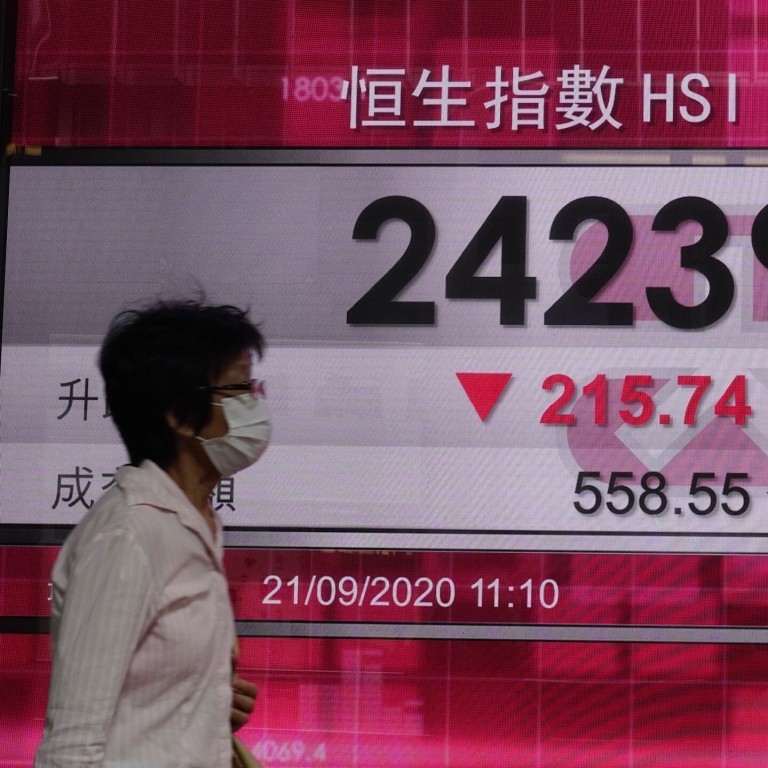
Is the Hang Seng Index or unemployment rate a better predictor of Hong Kong housing prices?
- Martin Wong of Knight Frank looks at data correlating major movements in the Hang Seng Index and unemployment rate with those in Hong Kong’s home prices
- The Covid-19 outbreak has pushed the Hong Kong unemployment rate to its the highest level in 16 years, while the benchmark stock index fell almost 14 per cent in the first half of 2020
In the last two years, Hong Kong has endured a series of major incidents, from the US-China trade war to the anti-extradition bill and associated social unrest, to the Covid-19 pandemic. The Hong Kong economy has been dampened since the third quarter of 2019, with GDP growth flipped from an uptrend at 0.4 per cent to a downbeat minus 9.0 per cent within four quarters.
However, only the HSI showed a high correlation with housing prices over the longer term, its moves preceding those of house prices by three to six months, especially for the mass residential sector.
With Hong Kong witnessing several socio-economic events recently, we have conducted further research into how housing prices and the HSI evolved during this period.
After the US imposed a 25 per cent tariff on a list of Chinese imports in August 2018, the HSI tumbled 10.4 per cent during the August-October period of that year, and mass residential prices followed by falling 5.1 per cent in the next two months.
During the outbreak of social unrest related to the anti-extradition bill, the index dropped by 9.9 per cent during the June-August period of 2019, while mass residential prices declined by 2.5 per cent in the following two months.
This year, we have seen the HSI slump by a stunning 13.7 per cent in the first six months amid Covid-19 and the worsening economy. The mass residential prices, however, have remained firm so far, slipping by just 1.6 per cent in the following two months.
Does this imply that the correlation between HSI and housing prices has come to a halt? It might be too early to draw such a conclusion, as we are comparing a six-month HSI movement to a two-month housing price movement. If the residential prices dropped further in the remainder of the year, our previous theory would continue to hold.
To investigate such possibilities, we have looked into the correlation between unemployment and Hong Kong housing prices, with a focus on the periods after the Asian financial crisis (1998-1999), Sars (2003) and the global financial crisis (2008-2009).
It is found that mass residential prices were strongly negatively correlated to unemployment rate in all three periods, with a lag of one to two months. However, such correlation does not exist between the unemployment rate and luxury residential prices. Compared with the HSI, the correlation coefficient, a parameter demonstrating the strength of correlation between variables, between unemployment rate and mass residential prices was even higher during these three periods. The coefficient of minus 0.83 (with minus 1 being a perfect negative correlation) is the strongest correlation we have ever seen for a factor affecting housing prices.
With the government implementing the Employment Support Scheme (ESS) under the Anti-epidemic Fund from June to November this year, the situation was made complicated because companies which have participated in the ESS are obliged not to make redundancies during the subsidy period. However, it has been observed recently that some companies have opted to terminate business without participating in the ESS, pushing up overall unemployment once again since the implementation of ESS. Referring to our new finding of a correlation between unemployment and housing prices, the recent upsurge in unemployment rates is likely to lead to a further decline in housing prices in the fourth quarter of the year.
If we see housing prices drop further in the immediate future, it does not only confirm our new correlation findings between unemployment and housing prices, but it will also support our previous correlation finding between the HSI and prices in the longer term.
Martin Wong is associate director, research & consultancy, for Greater China at Knight Frank

